Eurocell Bundle
How has Eurocell Transformed the UK Construction Market?
Discover the remarkable Eurocell SWOT Analysis and the story of Eurocell, a UK manufacturing giant. From its humble beginnings in 1974 as a PVC extrusion business, Eurocell has evolved into a leading provider of sustainable building materials. This brief history of Eurocell unveils its journey through innovation and strategic expansion within the UK construction industry.
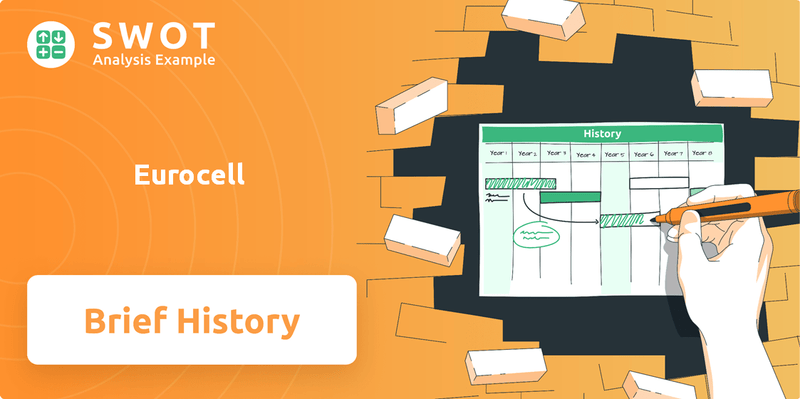
Eurocell's evolution from a PVC products manufacturer to a key player in the building materials sector is a testament to its adaptability and vision. The company's commitment to sustainability, particularly its extensive PVC-U recycling initiatives, sets it apart in the market. Understanding the Eurocell company timeline helps investors and industry professionals alike to appreciate its current market position and future growth potential, especially in a market increasingly focused on eco-friendly solutions.
What is the Eurocell Founding Story?
The Eurocell company, a significant player in the building materials sector, has a history that began in 1974. Its origins trace back to Derbyshire, United Kingdom, where it started as a PVC extrusion business. This early focus on PVC products laid the foundation for its future growth and expansion within the construction industry.
While the exact details of the founders remain less documented, the company's establishment was driven by the rising demand for PVC in construction. Initially, Eurocell concentrated on manufacturing PVC profiles, particularly for windows and doors, tapping into the growing preference for PVC over traditional materials.
The evolution of Eurocell through different ownership structures is a key part of its story. A management buyout in 1988 marked a significant shift, followed by the introduction of the first Eurocell-branded building products in 1991. Later, in June 1998, Tessenderlo Holdings UK Limited acquired a majority stake, and by 2003, they had taken full ownership. The company formally adopted the name Eurocell in July 2008, reflecting its broader market presence and strategic direction.
Founded in 1974 in Derbyshire, UK, as a PVC extrusion business.
- Initial focus on PVC profiles for windows and doors.
- Management buyout in 1988.
- First Eurocell-branded products launched in 1991.
- Acquisition by Tessenderlo Holdings UK Limited began in 1998, completed by 2003.
- Officially changed its name to Eurocell in July 2008.
Eurocell SWOT Analysis
- Complete SWOT Breakdown
- Fully Customizable
- Editable in Excel & Word
- Professional Formatting
- Investor-Ready Format
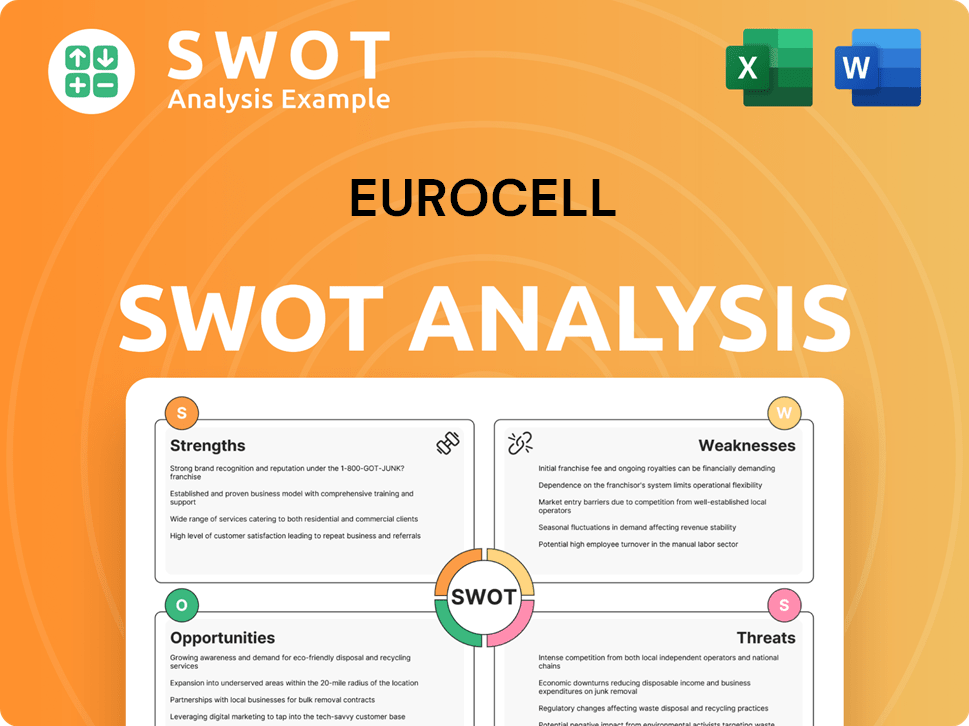
What Drove the Early Growth of Eurocell?
The early growth and expansion of the company, now known as Eurocell, were marked by a combination of organic development and strategic acquisitions. Established in 1974 as a PVC extrusion business, the company launched its first branded building products in 1991. This period saw significant changes in ownership and a focus on integrating complementary businesses to broaden its offerings in the building materials sector.
Following a management buyout in 1988, the company saw its first branded building products launched in 1991. Under Tessenderlo's ownership, which began in 1998, Eurocell expanded through acquisitions. Key acquisitions included Brunel Plastics in 2006 and Peninsula Plastics, Plastmo Profiles, and Cavalok Building Products in 2008.
A crucial step in its sustainability efforts came in 2009 with the acquisition of the Deeplas brand and Merritt Plastics, a post-consumer PVC-U recycling and extrusion company. Following the Merritt Plastics acquisition, Eurocell invested approximately £3 million in a new recycling facility to increase the supply of recycled materials from waste PVC-U window frames. This initiative aimed to decrease material costs and enhance production flexibility, reflecting the company's commitment to Growth Strategy of Eurocell.
In September 2013, the company was acquired by The H2 Fund, allowing it to operate independently again. This period culminated in a successful listing on the London Stock Exchange in March 2015. By October 2024, the share price reached around 169-170p, reflecting a year-to-date growth of approximately 47.6%.
The expansion strategy included a growing branch network, with over 210 branches nationwide as of April 2025, and plans for continued development. In 2024, e-commerce sales increased to £4.7 million, up from £3.0 million in 2023, indicating a strong growth in online sales channels.
Eurocell PESTLE Analysis
- Covers All 6 PESTLE Categories
- No Research Needed – Save Hours of Work
- Built by Experts, Trusted by Consultants
- Instant Download, Ready to Use
- 100% Editable, Fully Customizable
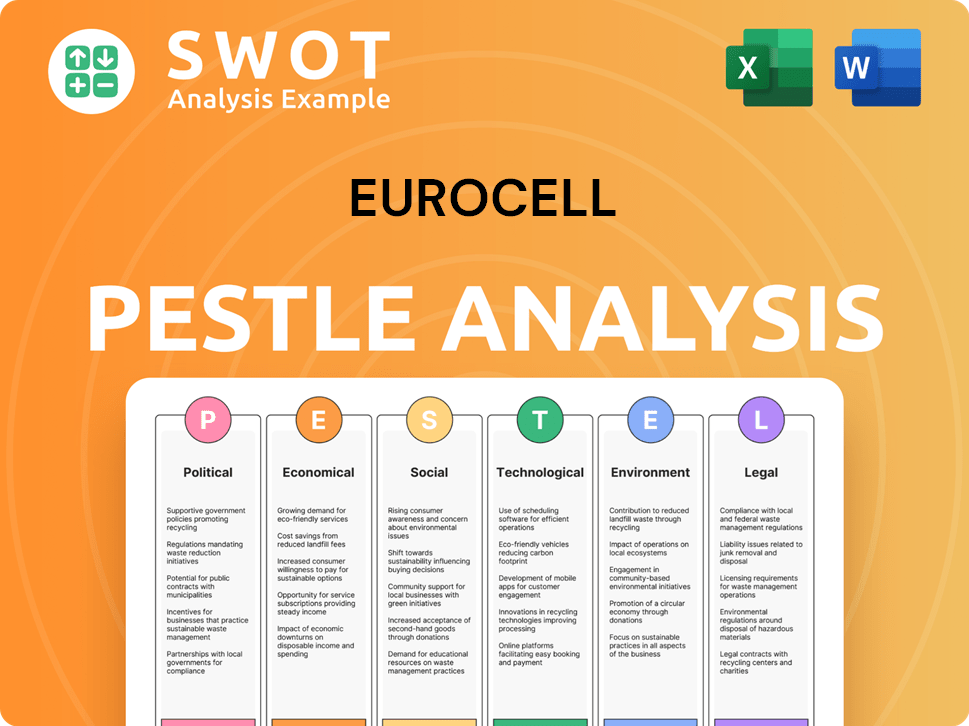
What are the key Milestones in Eurocell history?
The journey of the Eurocell company has been marked by significant achievements, innovations, and the ability to overcome various obstacles. The company's evolution reflects its strategic adaptability and operational efficiency within the building materials sector.
| Year | Milestone |
|---|---|
| 2023 | Recognized as the 'Best PVC-U Manufacturer & Recycler 2023 – UK' at the Design and Build Awards. |
| 2023 | Achieved 32% recycled PVC-U in its extrusion process. |
| 2024 | Experienced a 2% decline in sales revenue to £357.9 million. |
| 2024 | Increased adjusted profit before tax by 32% to £20 million. |
| 2025 | Introduced the Iconiq premium aluminium roof lantern. |
| 2025 | Acquired Alunet, strengthening its position in residential aluminium systems and composite doors. |
A key innovation has been the company's commitment to PVC-U recycling, establishing itself as the UK's largest PVC-U recycling operation. In 2023, Eurocell achieved a notable increase in recycled PVC-U use, saving the equivalent of approximately 3 million window frames from landfill.
The company is the UK's largest PVC-U recycler, demonstrating a strong commitment to sustainability. By 2023, Eurocell had increased the use of recycled PVC-U in its extrusion process to 32%.
Eurocell has set ambitious goals to increase the proportion of recycled PVC-U in its products to 40% by 2030. They aim to optimize material recovery to 88% by 2025 and 93% by 2030.
Ongoing product innovation is a key focus, with the introduction of new products like the Iconiq premium aluminium roof lantern in June 2025. This product is designed for ease and speed of fitting, enhancing its appeal.
Strategic alliances, such as the 20-year collaboration with BPW Windows Ltd, highlight Eurocell's role as a reliable supplier. These partnerships are crucial for market stability and growth.
Despite these successes, Eurocell has faced market downturns and competitive pressures. In 2024, the company experienced a 2% decline in sales revenue, primarily due to weaker demand in the new-build housing and repair, maintenance, and improvement (RMI) markets.
The company faced a 2% decline in sales revenue to £357.9 million in 2024, due to weaker demand in key markets. High interest rates and inflationary pressures contributed to the decline.
Competitive pressures on selling prices were evident, particularly in its branches, alongside overhead cost inflation. This environment necessitated strategic responses to maintain profitability.
Eurocell demonstrated resilience by proactively managing gross margins and benefiting from reduced input costs. This led to a 32% increase in adjusted profit before tax to £20 million in 2024.
The company's strategic response included a continued focus on cost reduction, operational improvements, and cash flow management. Acquisitions like Alunet in March 2025 strengthened its market position.
Eurocell Business Model Canvas
- Complete 9-Block Business Model Canvas
- Effortlessly Communicate Your Business Strategy
- Investor-Ready BMC Format
- 100% Editable and Customizable
- Clear and Structured Layout
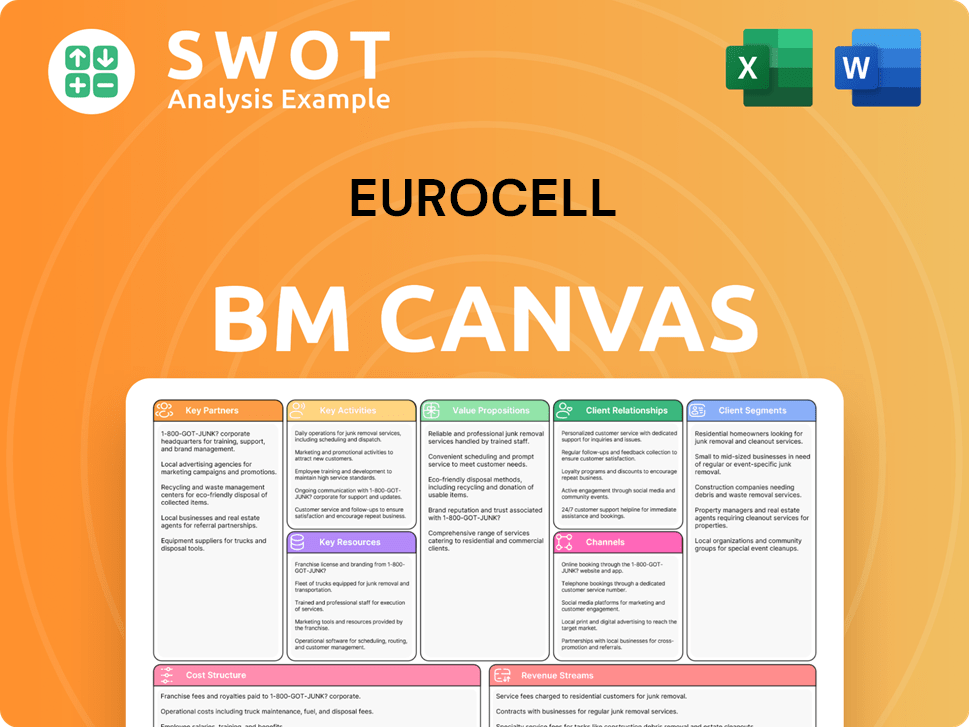
What is the Timeline of Key Events for Eurocell?
The Eurocell company has a rich history, starting as a PVC extrusion business and evolving into a leading supplier of building products. Over the years, the company has seen significant growth through acquisitions and strategic initiatives, including a successful listing on the London Stock Exchange. The company has also placed a strong emphasis on sustainability and has ambitious goals for increasing recycled materials in its products.
| Year | Key Event |
|---|---|
| 1974 | Eurocell is founded as a PVC extrusion business in Derbyshire, UK. |
| 1988 | The Group is acquired through a management buyout. |
| 1991 | The first Eurocell brand of building products is launched. |
| 1998 | Tessenderlo Holdings UK Limited acquires a 75% stake in the company. |
| 2003 | Tessenderlo Chemie N.V. acquires the remaining 25% stake. |
| 2006 | Acquires Brunel Plastics. |
| 2008 | Acquires Peninsula Plastics, Plastmo Profiles, and Cavalok Building Products; the Group changes its name to Eurocell. |
| 2009 | Acquires the Deeplas brand and Merritt Plastics, a PVC-U recycling and extrusion company, and invests £3 million in a new recycling facility. |
| 2013 | The H2 Fund acquires Eurocell from Tessenderlo Group, making it an independent business again. |
| 2015 | Eurocell successfully lists on the main market of the London Stock Exchange. |
| 2023 | Achieves 32% recycled PVC-U in its extrusion process, saving approximately 3 million window frames from landfill. |
| 2024 | Reports adjusted profit before tax up 32% to £20 million, despite a 2% decline in sales revenue to £357.9 million; e-commerce sales increase to £4.7 million. |
| March 2025 | Acquires Alunet for £29 million, strengthening its position in residential aluminium systems and composite doors. |
| April 2025 | Continues ambitious five-year growth strategy with ten new or relocated branches opened or confirmed since January, expanding its network to over 210 branches. |
Eurocell is focused on a five-year growth strategy, aiming for £500 million in revenue with a 10% operating margin. This includes expanding its branch network, with at least seven new branches planned for 2025, and increasing sales of windows and doors across its network.
The company plans to increase recycled PVC-U to 40% by 2030 and aims to recycle 88% of waste by 2025 and 93% by 2030. Decarbonization initiatives, including renewable electricity and fleet electrification, are also planned for 2025.
Despite market challenges, Eurocell is confident in making progress in 2025 by focusing on cost reduction and operational improvements. The Alunet acquisition is expected to increase the Group's adjusted profits, reflecting strong market share gains.
Eurocell aims for significant growth in extended living spaces, targeting incremental annual garden room and extension sales of approximately £30 million over the five-year period, building on £8.8 million in sales in 2024. The company is also expanding its product range.
Eurocell Porter's Five Forces Analysis
- Covers All 5 Competitive Forces in Detail
- Structured for Consultants, Students, and Founders
- 100% Editable in Microsoft Word & Excel
- Instant Digital Download – Use Immediately
- Compatible with Mac & PC – Fully Unlocked
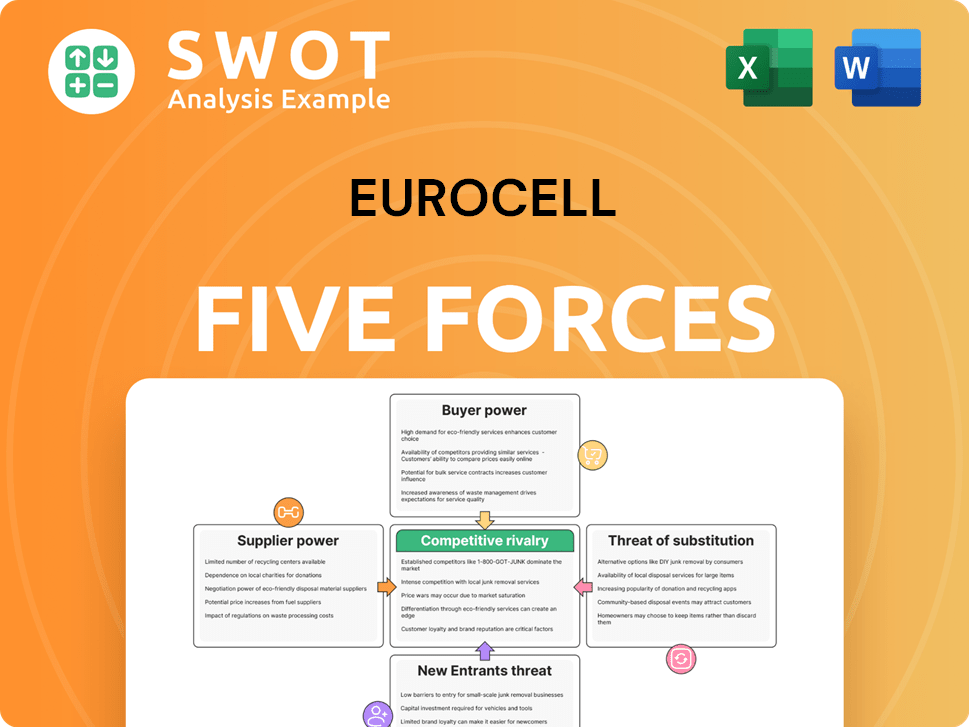
Related Blogs
- What is Competitive Landscape of Eurocell Company?
- What is Growth Strategy and Future Prospects of Eurocell Company?
- How Does Eurocell Company Work?
- What is Sales and Marketing Strategy of Eurocell Company?
- What is Brief History of Eurocell Company?
- Who Owns Eurocell Company?
- What is Customer Demographics and Target Market of Eurocell Company?
Disclaimer
All information, articles, and product details provided on this website are for general informational and educational purposes only. We do not claim any ownership over, nor do we intend to infringe upon, any trademarks, copyrights, logos, brand names, or other intellectual property mentioned or depicted on this site. Such intellectual property remains the property of its respective owners, and any references here are made solely for identification or informational purposes, without implying any affiliation, endorsement, or partnership.
We make no representations or warranties, express or implied, regarding the accuracy, completeness, or suitability of any content or products presented. Nothing on this website should be construed as legal, tax, investment, financial, medical, or other professional advice. In addition, no part of this site—including articles or product references—constitutes a solicitation, recommendation, endorsement, advertisement, or offer to buy or sell any securities, franchises, or other financial instruments, particularly in jurisdictions where such activity would be unlawful.
All content is of a general nature and may not address the specific circumstances of any individual or entity. It is not a substitute for professional advice or services. Any actions you take based on the information provided here are strictly at your own risk. You accept full responsibility for any decisions or outcomes arising from your use of this website and agree to release us from any liability in connection with your use of, or reliance upon, the content or products found herein.